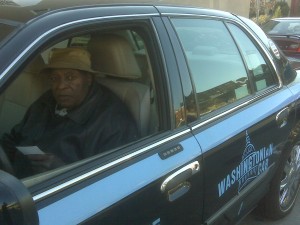LISTEN TO JOHN BUGG
Audio clip: Adobe Flash Player (version 9 or above) is required to play this audio clip. Download the latest version here. You also need to have JavaScript enabled in your browser.
John Bugg is a native Washingtonian and a professional taxicab driver in the District of Columbia. Since 1957, Bugg has witnessed attempts to make D.C.’s taxicab industry like the rest of the country, where a few big companies dominate. D.C. remains unique in that many taxicab drivers independently own and operate their own vehicle. According to Bugg, it has always been a fight to keep the industry from being taken over. “We’ve been struggling in this thing for Lord have mercy, man. Ever since I can remember getting into a taxicab to do some business, it’s been a struggle. And it’s always been that element there to try and take this away from us. Even before Mayor [Walter] Washington and every mayor after that, even Marion Barry, they’ve tried to turn us around and take this thing away from us.”
Under Mayor Adrian Fenty, D.C. taxicabs switched from a zone system to a “time and distance meter.” The switch damaged drivers financially because the meters were set at one of the lowest rates in the country. “We haven’t made no money in three years,” said Bugg. D.C. taxicab drivers worked hard to defeat Mayor Fenty and now they are looking to Mayor Vincent Gray to fulfill his commitments to them. “I got a feeling that Mayor Gray gonna turn this thing around,” said Bugg. In addition to raising meter rates, D.C. taxicab drivers are calling on Mayor Gray to examine how they are treated by hack inspectors, as well as to appoint a D.C. taxicab driver to the DC Taxicab Commission (presently there are none).
Periodically, issues surrounding D.C. taxicabs spill into the public spotlight, but rarely do you hear a discussion of the industry’s history. It was one of the first professions that allowed African Americans to gain entry into the middle class. Not too long ago, Bugg said, “If you saw a minority up in [an upper-middle class] neighborhood, he had a cab sitting out front of his house. And this is how they sent their kids to college, they sent their kids to private schools… It was just a way of life for us because nobody would hire us in a meaningful job where we could get paid and live a lifestyle that we live now… I’d say that we’ve come a long way, man. I mean, my boy, he graduated from Maryland University in Business Administration and there’s no way in the world he could have done that if I had not had my cab.”
Bugg can remember a time when African Americans could not ride in most taxicabs in D.C. “My mother and I stood down in front of the old Hecht Company, right there at 7th and G, 7th and F, and we stood there in the rain and the Yellow Cabs used to come up through there, the Diamond Cabs used to come up through there, and they would not pick us up. So we had to wait for one of the drivers that was with the companies like Diplomat, Capitol, one of the companies that were not White companies. And that’s the only way we could get a ride in a taxicab.”

